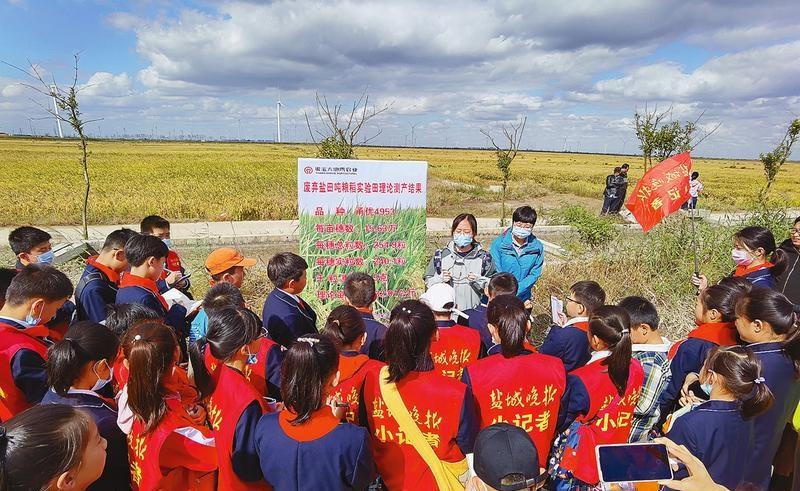
Teachers of Yancheng Normal College briefed the young reporter on the situation.
Coming to the countryside, the young reporters were excited.
Peel off the rice husk and see what's inside?
The efficient harvester opened the eyes of the little reporter.
Small reporters check the production.
Tang Boping, dean of the Wetland College of Yancheng Normal University, exchanged views with small reporters.
□ Lianmeng Reporter Yao Meng/Wen Zhang Yixuan/Photo
Yancheng Evening News On October 17, the independent innovation project of the Wetland College of Yancheng Normal University "Technology Innovation and Integration of Abandoned SaltField Tons of Grain and Rice" was held at the on-site actual production acceptance appraisal meeting. 35 young reporters from Yandu Experimental School in Yancheng City witnessed the birth of a new record of 852.3 kilograms of rice per mu of heavy saline soil in abandoned salt pans in China.
There is a wetland course in Yandu Experimental School, which is witnessed by the school's small reporters, which is also considered a "professional counterpart". On the way to sheyang Shuntai Farm, the acceptance site, the young reporters have begun to exchange various information collected. Some people know that growing grain on saline and alkali land is a big problem, some people find that salt-tolerant planting needs to transform soil and seeds, and some people compare the relevant information with Yuan Longping's scientific research team in The experimental field in Rudong, Nantong.
Coming to Sheyang Shuntai Farm, the scenery along the way opened the eyes of the young reporters. Looking up, the white clouds and blue sky make the children rejoice; on the riverbank, there are flocks of chickens and ducks, and in the fields, the fruits are full of rice ears hanging low. A young reporter pointed at the rice spike and said loudly: "Look, this is what the Chinese teacher said about 'heavy'!" ”
Coming to the edge of the experimental field, teachers from the Wetland College of Yancheng Normal University began to explain the project to the young reporter. The young reporter skillfully pulled out the interview book and raised his hand from time to time to ask questions. Many questions surprised the explanatory teachers.
When you come to the test field, you can't do it without touching a handful of rice ears with your own hands. The young reporter took a handful of them by hand, carefully observed and pondered repeatedly. For these children who grew up in the city, walking into the fields is a rare attempt in itself. "Peel off the rice husks and inside is rice!" The children finally have their own discoveries.
In the face of the questions of the small reporter, Tang Boping, dean of the Wetland College of Yancheng Normal University, began to introduce in detail: Why do you want to grow grain on saline and alkali land? What is the difficulty of growing grain in saline and alkali land? What new technologies and new paths did the salt division team use? What would be the significance of yielding more than 800 kilograms per mu? Faced with the rare opportunity, the young reporters listened carefully and remembered carefully, and some even held a voice recorder, which seemed particularly professional.
Acceptance officially begins. When a harvester drove into the rice field to start harvesting, the children made a heartfelt "wow" sound. In their eyes, this efficient, powerful, and fast harvester is far beyond their imagination. Some children's mouths were wide open, and only then did they say, "It turns out that harvesting rice is not with a sickle!" ”
After harvesting, the harvester transports the rice grains to the grain truck, which then drives to the grain yard for weighing. The young reporters followed along. The method of weighing is to weigh the weighbridge on the scale with a full load, and then weigh it twice after unloading the grain. The result of the two weighings is subtracted, which is the weight of a cart of rice grains.
Young reporters firmly remember the message that "yielding more than 800 kilograms per mu is high yield", squeezing into the test control room one by one, recording the data of each weighing, and then manually calculating the results in the interview book. When the new record of 852.3 kilograms per mu was announced, the young reporter cheered as if it were the grain he had planted by his own hands.
"Our school offers a wetland curriculum and also has a wetland children's research institute to popularize local ecological civilization for students. This study trip provided children with a rare opportunity to practice, and I believe it will leave many children with unforgettable memories. Liu Yuanyuan, head of the curriculum construction center of Yandu Experimental School, said.
【Source: Yancheng Evening News】
Disclaimer: The copyright of this article belongs to the original author, if there is an error in the source or infringement of your legitimate rights and interests, you can contact us through the mailbox, we will deal with it in a timely manner. Email address: [email protected]